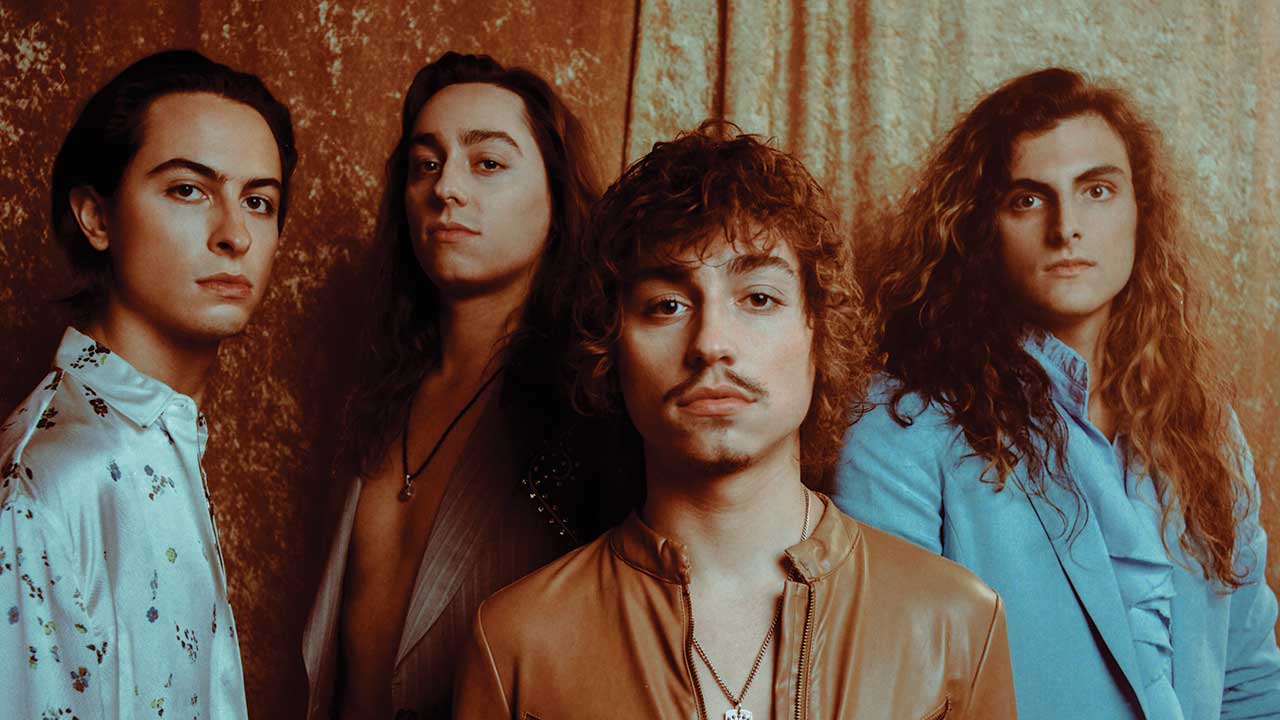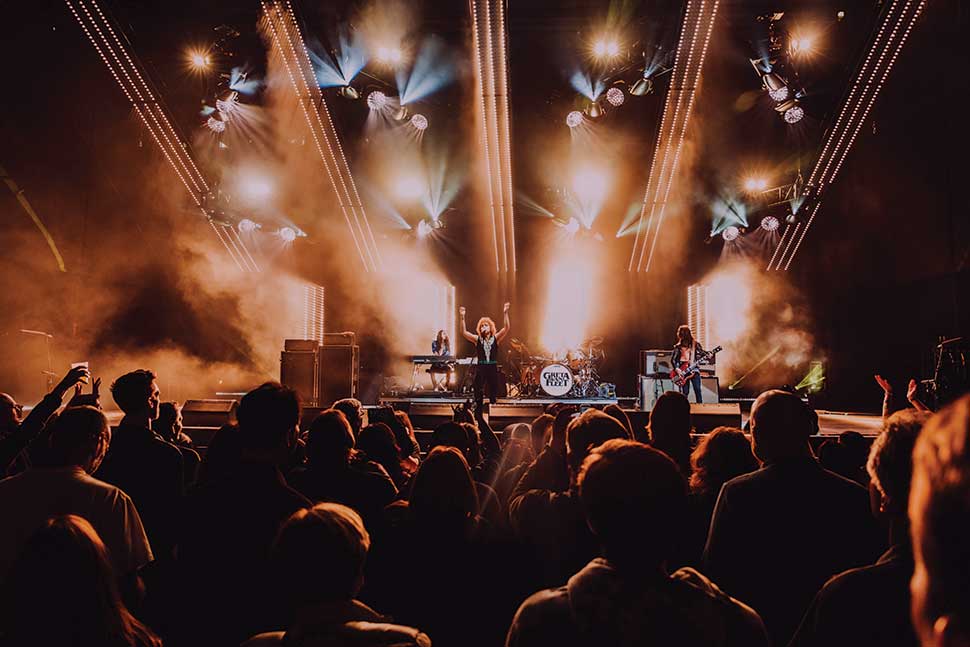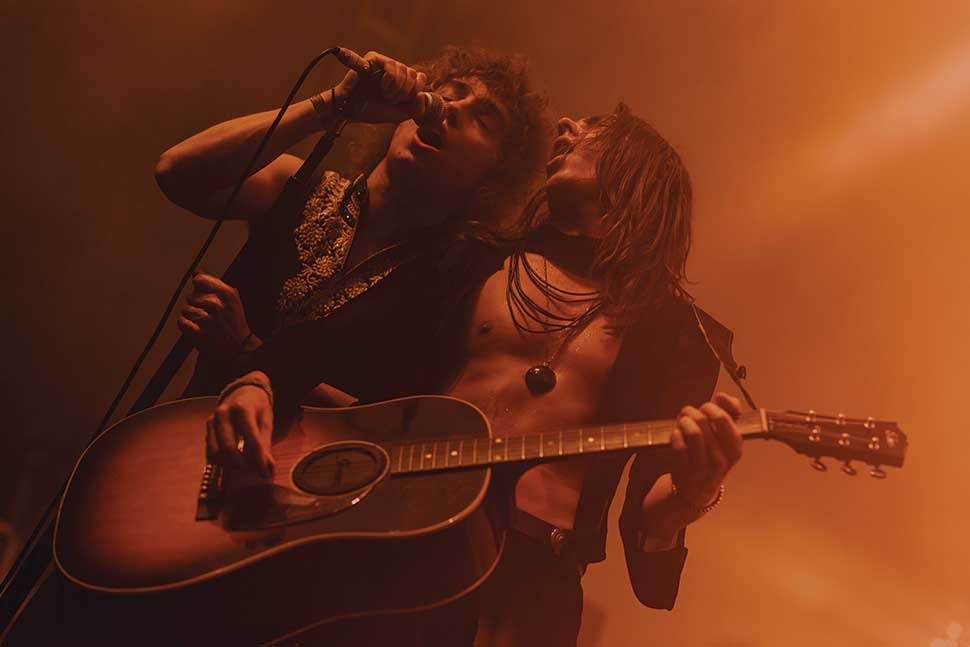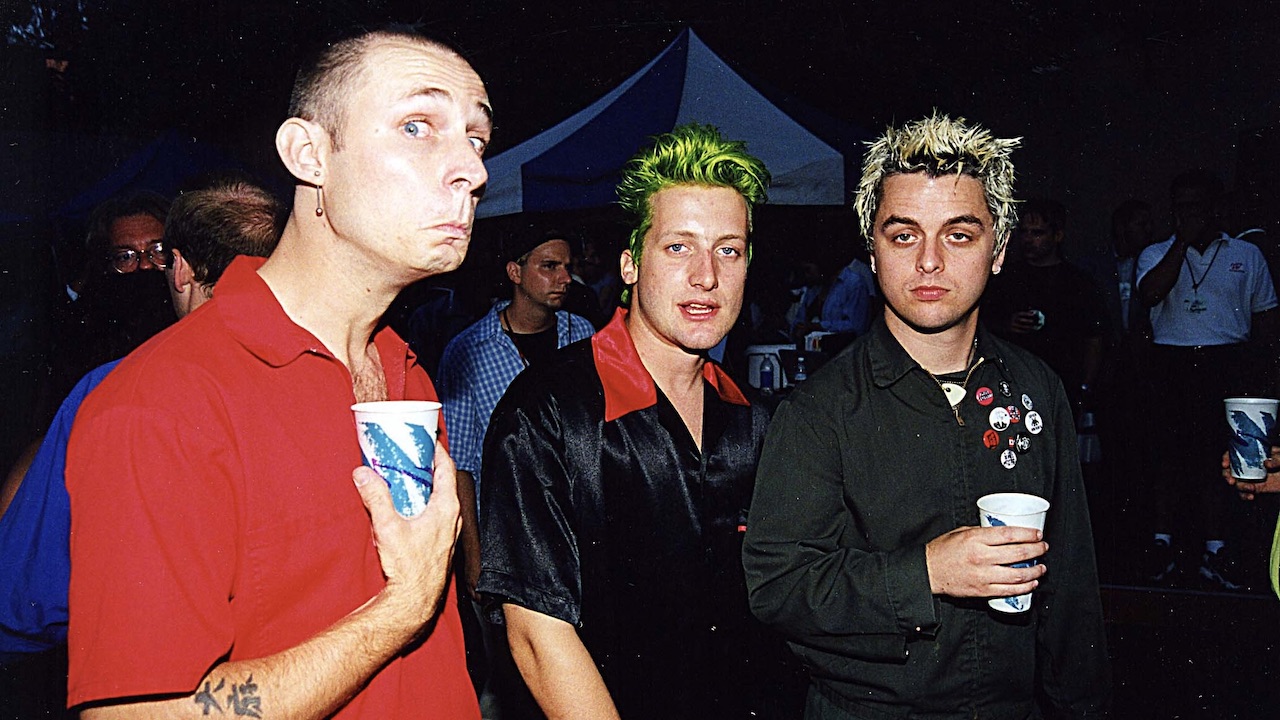Greta Van Fleet interview: "It’s our generation’s turn to toy with rock’n’roll"
Had you blinked in 2019 you might have missed Greta Van Fleet on their flight to the stratosphere. With new album The Battle At Garden's Gate turbo-charging the engines, they’re getting even closer

How do you survive lockdown with your twin brother? For Josh and Jake Kiszka, Greta Van Fleet’s singer and guitarist respectively, it’s all about space. Happily their capacious Nashville pad, where they’ve hunkered down for the past year, has plenty of that. Listening to them chat about their living situation over Zoom – with a curious mix of schoolboy gusto and the self-assurance of two worldly hippies – it’s hard not to think of childhood sleepovers (with a bigger budget).
“We have a rehearsal space here and we’ve just been non-stop jamming around,” quietly earnest guitarist Jake says with a grin. “Testing out new material and stuff and playing it ourselves and bringing new things in.”
“I’m surprised Jake and I haven’t killed each other!” Josh says in a separate call the next day. “But it’s three storeys, so he has his floor, I have mine, and there’s this sort of middle ground. It’s like a battlefield, if you want to look at it that way.”
When we talk, the pint-sized singer (the eldest of the two by five minutes) is sitting in their large, stylish kitchen nursing a hangover. “A world of hungover!” he declares good-naturedly. Josh declares things a lot – it’s a bit like watching a young, moustachioed hybrid of Ron Howard and Owen Wilson holding court at a cocktail party. “We had a long meeting last night, and I thought: ‘Oh, I’ll get through this by drinking!’ And now I regret it!”
What’s your poison?
“I like a good red wine. I think that’s where it’s at.”
Currently they’re renting, although Josh has his eye on a swishier place in town. “I almost bought this house, a beautiful house,” he enthuses, “this mid-century modern which I really love. So at this point I’m kinda rolling up my sleeves going: ‘Alright, we’ll design this thing!’ So right now I’m looking for architects.”
Sign up below to get the latest from Classic Rock, plus exclusive special offers, direct to your inbox!
Josh Kiszka is 24. But then everything has happened so quickly for the Michigan band (completed by younger brother Sam on bass and keyboards and Danny Wagner on drums) that the young frontman’s architectural aspirations are arguably just in proportion with the world he currently inhabits.
In any case, the roots of Greta Van Fleet’s old world side – poured luxuriantly into their grandiose new album The Battle At Garden’s Gate – go way back. But we’ll come to that.

Several years ago, Greta Van Fleet were playing bars, biker gatherings and other small-time gigs in and around their rural home town of Frankenmuth. Then in 2017 everything blew up with a magnitude that seemed to come out of nowhere. Armed with a pocketful of Led Zeppelin-esque bangers and a wardrobe to match, they went from being a bunch of promising newbies to a world-touring, Grammy-winning colossus in what felt like no time at all.
Since then they’ve played Elton John’s Academy Awards bash (at his personal request), done shots on tour with Dave Grohl, and had Tom Hanks show up at a studio session and declare himself a fan – all the while drawing both rapturous praise and scathing criticism in the sort of measures that confirm you have definitely ‘made it’. That kind of shit isn’t supposed to happen to new rock bands any more, surely?
“You fly to Europe for the first time and you play at places like [London’s] the Black Heart or something,” Jake reflects, smiling but more serious than his frontman twin. “And then you’re in a sprinter van, and you come back and then you have a tour bus, and then you have two, and then you have a semi-truck, and then two semi-trucks, and then you have this crew.
"It sort of spirals, and at some point you go: ‘Wow, when did it get to this point?!’ When has it evolved to such a degree where we’re touring with all this equipment, all of these people, all of this gear… So yeah, it’s been wild.”

There are some traces of celebrification. In conversation the Kiszkas are friendly and thoughtful but audibly media-trained (a little averse to specific tales, prone to slightly worthy waffle). A woman from their management sits in on both interviews (when we ask Josh if this is the norm he replies “Yes” a little sheepishly, before adding smoothly: “That way they can stop me cursing too fucking much!”).
“You become a little more private, a little bit more secluded from all the madness that’s going on around you,” the singer concedes. “So in one way it’s like: are you staying in the reality of things? Are you being too protected?’ But yeah, it’s a huge group of people that are working to make what we’re doing possible. It’s great that we have that, but it’s very different from the way that probably a lot of people live.”
To be fair to them, it’s the sort of glorified babysitting that often comes with artists at a certain level. Plus, going from small-town life to having thousands of fans singing your songs back at you, from Europe to South America and beyond, in the space of a couple of years… That must change you as a person?
“It’s one of the strangest things,” Josh says, nodding. “You go around the world and you’re meeting friends you’ve never met before. They know quite a bit about you, sometimes more than you would ever imagine, and they talk to you just like you’re old friends, and that’s incredibly beautiful. But yeah, I suppose there’s… a swelling of confidence that comes from that.
"It’s generating a lot and it’s fuelling you and… it gives you the ability to give that back to so many people. So it is really an incredibly spiritual process. I’ve been able to grow on an intellectual level, on a spiritual level, in so many ways. I always have to be conscious of the ego too! Which is an impossible task.”
Rural children at heart, they gravitate to nature for solace. On the road “taking [our] clothes off and jumping into the water or something” has been a favoured way of staying grounded. These days in Tennessee, driving out to the Smoky Mountains has a similar effect.
Has your ego run away from you at all?
“Yeah, I think a little bit sometimes. Especially when you’re so exhausted that you kind of feel… I suppose you resort to using… that kind of process when you’re so exhausted. Sometimes you’re like: ‘Clearly something’s disconnected here. Why am I taking out all of this frustration on other people or things?’ But I think ultimately it comes back around when you step back and take a breath, and realise what’s actually going on."

Staying at home for the past year, like the rest of the world, has given the band the chance to do just that. After three years of non-stop touring, there was a lot to digest. Seemingly they’re still digesting it.
“All of a sudden it’s like: ‘Wow, we get to actually identify with what’s going on,” Jake says, “and be creating in an alternative aspect, I guess.”
“That would never have happened if the world hadn’t stopped,” Josh observes. “I don’t think we would ever really have gotten the time to take a moment and reflect. I think ultimately it’s really healthy, but in retrospect, looking back at everything that’s happened in the last three and a half, four years is just madness.”
One could argue that Greta Van Fleet had ground to a bit of a halt before COVID struck. At the start of 2019 a throat infection put Josh out of action and forced them to postpone a full European/UK tour and shows in Australia and the US. Were they burning out? Perhaps this unexpected year at home came at a good time?
“It was so natural at that point,” Jake says of touring life circa 2019. “It was so, and it is kind of natural to us, more now. Again it’s this thing with evolution. I think we were really road-trained at that point that we were sort of, y’know, pirates of the road, really! We kind of were trained to exist out there and tour. But there’s a sort of exhaustion. Sometimes it can get around to you, but if you have one day off you come right back around. There were bouts of exhaustion, yeah, but I think ultimately we were pretty used to it.”
Burning the candle at both ends?
“Yeah, it felt like that,” Josh agrees. “It was extraordinary and exhausting. And that’s really how it goes when you’re trying to do so much all the time. And again, a good reason for this year to rest, recollect, regather.”
Serendipitously, 2020 was also a chance to round off their second full-length album, The Battle At Garden’s Gate. If debut Anthem Of The Peaceful Army was to some degree an exercise in classic-rock parroting – albeit a particularly good one – Garden’s Gate is the layered, expansive sound of a band doing what they really want to do, safe in the knowledge that their now-established, devoted fan base won’t leave them in a hurry.
Recorded in hi-spec studios in the rolling canyons of Hollywood, with producer Greg Kurstin (Paul McCartney, Adele, Foo Fighters) and a string quartet at their disposal, it’s a cinematic Aladdin’s cave of past riches. The swooping, densely packed stuff of classic rock, folk, blues and prog fever dreams made by people who really love this music.
Josh’s raspy cries will still likely divide opinion (not wholly unlike, say, Geddy Lee or Jon Anderson in that regard), but they sit comfortably in the grandeur of their musical surroundings.
“It is a vastly dynamic album and it’s very intense,” Jake says, nodding. “We wanted to create something that was orgasmic and cinematic to a certain degree, which I suppose is an ode to our childhood as well.”
Lyrically there’s Huxley-esque dystopia (Age Of Machine), 15-century vessels (Caravel), Old Testament fire and brimstone (The Barbarians) and thoughts on the human condition, among other things, creating an artistic, at times unwieldy parallel universe. Where does all this come from? Books? Films? Mind-altering drugs? Something else?
“Years of contemplation, I guess,” Josh replies. “And some self-reflection. A lot of reflection and meditation. But it is borrowing from a lot of literature, some motion pictures… and yes, some vices [laughs], some… er, yeah, some secret sauce, if you would.”
Led Zeppelin might be Greta Van Fleet’s most exhaustively cited comparison (not entirely unreasonably), but further listening reveals touches of the Eastern, African, Kirtan and other world music that Josh in particular laps up. There’s Hindu chanting in Trip The Light Fantastic, and epic album closer Weight Of Dreams has a mournful melodicism that nods as much to Demis Roussos as to Robert Plant.
“He’s one of the best,” Josh enthuses of the Greek star. “His stage performance, well it was probably on some television programme, but he was in this extraordinary dress, a big hairy man singing like that. It blurred so many lines and broke so many rules.”
The old-world, old-soul nature of Greta Van Fleet goes back to their rural upbringing in Frankenmuth (population: five thousand and something). The three Kiszka brothers grew up in a house filled with highbrow literature, records and films. Ingesting it all was encouraged. Their father was a chemist and a blues musician, with degrees in philosophy. Their mother was a science teacher and “quite the rebel”. Between them they created a “unique” upbringing and an “intellectual playground” of sorts for their kids.
“Everything was basically laid out,” Josh explains. “It was like, if you had a question about things that were intriguing to you, it was pretty straightforward. It’s like, the word ‘sex’ was not taboo, so to speak. Jake said ‘orgasmic’, right? [we’d relayed his brother’s description of the new record] It’s like, this is biology. I think the upbringing had a lot to do with where we are now.”
So, in case you were still wondering, no they’re really not just a bunch of Zeppelin fan boys. Sam is more of a jazz guy, in fact. Josh and drummer Danny love folk music. A glance at their bookshelves reveals Romantic classics, works by noted Zen philosopher Alan Watts, Paulo Coelho’s magical realist vision The Alchemist, the films of Kubrick, Tarantino, Coppola…
“Hopefully this acts as an invitation for people to go out and delve into all those beautiful works of literature,” Josh says with a smile, and he’s being totally sincere. “We cannot lose that, ever. Read, read, read. Write, write, write. Y’know? It’s a little cheesy but it’s so true.”
It would be easy to write off such cultural grandstanding as baseless ego-flexing; the chatterings of jumped-up wunderkinds with a lot of people telling them how brilliant they are. Clearly there’s an element of that, but talking to them (and listening to the new songs) it’s even clearer that all these sensibilities, these instincts of theirs, run bone-deep.
With Garden’s Gate now under their belt, and heaps of other songs up their sleeve, Greta Van Fleet are more ready than ever to return to the road, only this time, it appears, with a more sober appreciation of what that life really entails.
“I haven’t experienced illness this year at all,” Josh says. “Which means what I was doing before was so physically and psychologically exhausting that I was taxing myself and I was getting ill, because my body couldn’t keep up with the speed of things. But yeah, it was burning the candle at both ends.”
He stops, then continues with a grin: “Part of me, the masochist in me, is going: ‘Oh yes, but that was so good! Let’s do it again!’ You’ve got to love that.”
Greta Van Fleet are not stupid. They know that most of the world seriously doubts rock’s capacity for genuine freshness circa 2021 – that it’s far more common, even among rock fans, to find those who’ll sigh wearily that ‘It’s all been done already’. But the band don’t care. They are admirably, wholeheartedly convinced of rock’n’roll’s ability to reinvent itself, and are excited to be among those doing it. Whatever your views in that regard, it’s hard to resist such commitment.
“There’s so much more that can be done,” Jake says. “Now it’s our generation’s turn to sort of toy with rock’n’roll, create these new ideas, bend and break the rules. It’s exciting.”
“We have so much more to do,” Josh agrees, “and we’re really excited to do it. And we’re excited to see other people doing it. It’s kinda special. A special sacred kind of… family. Cult-ish? Yes! Hahaha… Hasn’t rock’n’roll always been a cult, in a way?”

Polly is deputy editor at Classic Rock magazine, where she writes and commissions regular pieces and longer reads (including new band coverage), and has interviewed rock's biggest and newest names. She also contributes to Louder, Prog and Metal Hammer and talks about songs on the 20 Minute Club podcast. Elsewhere she's had work published in The Musician, delicious. magazine and others, and written biographies for various album campaigns. In a previous life as a women's magazine junior she interviewed Tracey Emin and Lily James – and wangled Rival Sons into the arts pages. In her spare time she writes fiction and cooks.
